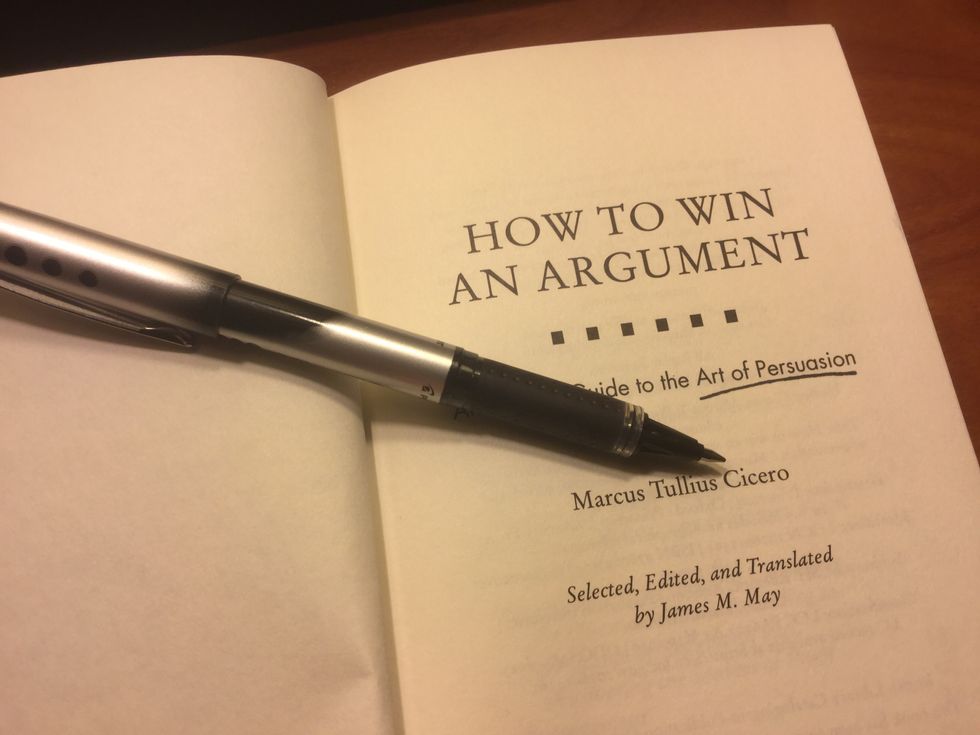As I discussed last week, words hold a power beyond their appearances and initial thoughts. Not only do they influence minds and beliefs, but they also influence perspectives and true meanings. However, this ability varies in regards to their transformations. By which I mean, definitions involving truth and intent can change through the mediums they are meticulously used for. The specific two mediums I'll be discussing are writing and oral (this article will mainly focus on speech and oratory).
There is a grave difference between speech and literary writing--a difference that involves further analysis of their definitions. Speech is defined as a means of vocalizing opinions and concepts--the spoken word. Writing, maybe a little obviously, is the written word. However, it is also described as art, composition, and a method of symbolization.
In regards to speech, I can refer to various infamous leaders from the past and present times that have fully utilized the ability of oratory. However, a particular orator comes to mind that is considered one of the greatest speakers of his time and beyond: Marcus Tullius Cicero. As for his particular significance in oratory writing, Cicero also wrote a fascinating essay involving the 'Art of Persuasion.' Within the work, he distinctly divides the method of oratory into three sects: 1. Judicial 2. Deliberative 3. Demonstrative. Judicial, as the namesake entails, involves persuasive speeches in court systems as well as the Roman Republic of the time. Deliberative leans more to debate, attempting to prove what is more important or eminent in a public council. And demonstrative presents a case of "praise or blame," such as a funeral oration or eulogy. Now these sub-genres, though seemingly primitive, present a framework that even speeches of present time work off of continuously.
Elements of further note I would like to turn your focus towards are strategy and structure. Both oratory and literary writing involve these two tools for composition and persuasion; it is in their execution, though, that they differ greatly. Again, for the purposes of this article, I will focus on the oratory genre.
Strategy: This element of fiction and nonfiction writing plays a significant role in rather all aspects of life. Whether playing a chess game with your sibling, or planning the means to steal the best parking spot when driving to work, it eventually sneaks into your primary essentials. No more though does strategy seem more eminent and necessary than in politics and debate. Oratory writing is fundamental in a political occupation; strategy is the necessary adjunct, however, to be truly successful. Strategy in speech does involves words, but more importantly holds silences.A good example would be "Engaging Protesters: Trump vs Obama."
In this video, we see examples of silence, of strategy, being used in regards with addressing protesters and their concerns. While Trump yells and persists to encourage violence as apparently the only answer to disagreement, Obama waits. No, actually, he listens. He patiently waits to hear what each protestor (in the video) has to say only to calmly and eloquently reply, "I understand you may disagree--but...we gotta be able to talk honestly about these issues...alright?" This is strategy. Rather than simply enticing the crowd into a frenzy, keeping the same tone throughout his speech only to shout once in awhile--Barack Obama uses specific tones and volumes for certain times throughout the duration of his oratory. Just as every word and phrase has a decided purpose, so too do his pauses; They are his time, and therefore our time, to breath and think.
Structure: Again, similar to strategy, structure applies to both mediums involving words and writing; it is (plainly) a means of organization. Many of you who have had to write essays (and speeches) were taught a certain structure to follow, such as the five paragraph format. However, the structure I'm referring to here has less to do with organization and everything to do with clarity and meaning. The best way I like to think of it is the 'So What' paper, that is, why? What is important here? What are you trying to say? What are you arguing for? Against? Why? I digress; again, we have come to question of purpose as in my last article.
Just as words are the pursuit of meaning, speeches and arguments are the desire for further clarity to that meaning. Join next week as we explore further into the power of words from poetry, prose, and novels.



 StableDiffusion
StableDiffusion StableDiffusion
StableDiffusion StableDiffusion
StableDiffusion Photo by
Photo by  Photo by
Photo by  Photo by
Photo by 
 Photo by
Photo by  Photo by
Photo by  Photo by
Photo by  Photo by
Photo by  Photo by
Photo by 












